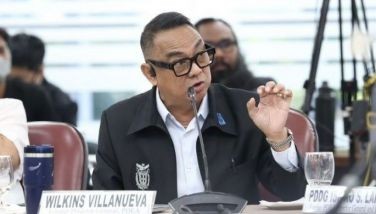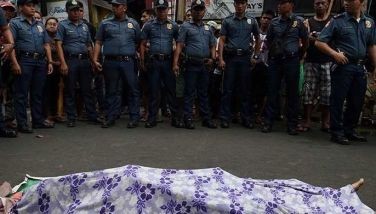Reds welcome prisoner release
April 5, 2004 | 12:00am
Communist rebels welcomed yesterday the government’s promise to release 32 detained insurgents, saying the gesture would promote goodwill ahead of peace talks.
Government negotiators agreed, in talks with representatives of the National Democratic Front (NDF) in Oslo, Norway over the weekend, to free 32 prisoners in batches this month and in May.
Amid the peace talks, troops killed five New People’s Army (NPA) rebels in separate clashes in Agusan del Sur and nearby Misamis Oriental over the weekend.
Army troops patrolling a remote barangay chanced upon 20 rebels at dawn yesterday in Esperanza town in Agusan del Sur, setting off a brief gunbattle that left three guerrillas dead.
No soldiers were wounded and the other rebels fled, the military said.
Separately, two guerrillas were killed and a soldier was wounded in a clash Saturday in Misamis Oriental.
Several rebels fled into nearby hills, the military said.
Gregorio Rosal, Communist Party of the Philippines spokesman, said the release of the prisoners was long overdue, noting that it was first promised by the government during talks in 2001, which were later suspended.
"Despite the long delay, the forthcoming release of 32 political prisoners is at least a good start for the building of confidence in the present peace negotiations," he said in a statement.
However, Rosal said Donato Continente and Juanito Itaas, who had been convicted of killing US army Col. James Rowe in 1987, must also be freed, along with the 32 other detained rebels.
The 32 prisoners formed only a portion of the more than 300 insurgents the CPP wants freed, he added.
Government and rebel peace negotiators ended a round of peace talks Saturday with agreements on the release of political prisoners and efforts to remove the rebels from international terrorism lists.
The government wanted a comprehensive peace agreement with the rebels within six months.
The latest round of talks, which began Tuesday in Oslo, Norway, stretched into the early hours Saturday morning before both sides agreed on the text of a six-page joint statement. — Benjie Villa, AFP, AP
Chief government negotiator Silvestre Bello III said all seven points of the agreement were important to the peace process, including how to handle the terrorism listing of the rebels and the release of political prisoners sought by rebels.
The government stopped short in the statement of openly urging other governments to drop the terrorist listing but agreed to "communicate with all concerned states and other entities the significant progress of the peace talks."
Both sides promised to conduct an information campaign about the peace process, so that other countries could decide whether the terrorism listing was warranted.
Bello, speaking to reporters after the document was signed, said it would probably be good for the peace process if the terrorism listing was dropped.
"It would create a favorable atmosphere for the process," he said.
Chief rebel negotiator Luis Jalandoni, speaking separately to reporters, said he believed the international community would come to realize that the NDF
and its leaders are not terrorists but freedom fighters.
"We are confident," he said. "We feel if the
(information) process is continued, more and more the international community will say, ‘Well, they are not terrorists.’"
The joint statement confirmed that the government will start releasing the 32 prisoners, including women and children, within 30 days starting Monday.
Bello said a final peace agreement could be signed within six months, while Jalandoni said it would take at least 18 months.
Bello and Jalandoni agreed that the national elections on
May 10 may affect the talks if the government changes.
He said they had discussed the possibility of a cease-fire during the election period, but no solution was reached.
Jalandoni said the rebels don’t support the election process and, as such, don’t see it as grounds for a truce, which can only come after a final agreement is signed.
Government and rebel peace negotiators failed to outline
concrete assurances on demands by some political parties that their candidates will not be harassed by the NPA if they do not pay so-called permit-to-campaign fees.
The agreement merely stated that "freedom of thought and expression, freedom of conscience, political and religious beliefs, freedom of movement and travel, as well as the rights of free speech, press and assembly, shall be observed and protected."
The NDF remained adamant that Malacañang should take
a "more active stand" in lobbying for the removal of the CPP-NPA and self-exiled communist leader, Jose Ma. Sison from the terrorist list of the US government.
Last February, when the peace talks were revived, the government agreed with the NDF there will "jointly and separately" appeal the "terrorist" tag and ask foreign governments to support the peace process.
Both sides also agreed to "operationalize" within this month the Joint Monitoring Committee that shall implement the Comprehensive Agreement on Respect for Human Rights and International Humanitarian Law.
Members of the JMC from the government and the NDF, including their respective observers, were already appointed last February.
The JMC has been tasked to receive and act on complaints of human rights abuses by the government and the rebels.
The next round of talks will be from April 26-29 at a yet-to-be determined venue. — Benjie Villa, AFP, AP
Government negotiators agreed, in talks with representatives of the National Democratic Front (NDF) in Oslo, Norway over the weekend, to free 32 prisoners in batches this month and in May.
Amid the peace talks, troops killed five New People’s Army (NPA) rebels in separate clashes in Agusan del Sur and nearby Misamis Oriental over the weekend.
Army troops patrolling a remote barangay chanced upon 20 rebels at dawn yesterday in Esperanza town in Agusan del Sur, setting off a brief gunbattle that left three guerrillas dead.
No soldiers were wounded and the other rebels fled, the military said.
Separately, two guerrillas were killed and a soldier was wounded in a clash Saturday in Misamis Oriental.
Several rebels fled into nearby hills, the military said.
Gregorio Rosal, Communist Party of the Philippines spokesman, said the release of the prisoners was long overdue, noting that it was first promised by the government during talks in 2001, which were later suspended.
"Despite the long delay, the forthcoming release of 32 political prisoners is at least a good start for the building of confidence in the present peace negotiations," he said in a statement.
However, Rosal said Donato Continente and Juanito Itaas, who had been convicted of killing US army Col. James Rowe in 1987, must also be freed, along with the 32 other detained rebels.
The 32 prisoners formed only a portion of the more than 300 insurgents the CPP wants freed, he added.
Government and rebel peace negotiators ended a round of peace talks Saturday with agreements on the release of political prisoners and efforts to remove the rebels from international terrorism lists.
The government wanted a comprehensive peace agreement with the rebels within six months.
The latest round of talks, which began Tuesday in Oslo, Norway, stretched into the early hours Saturday morning before both sides agreed on the text of a six-page joint statement. — Benjie Villa, AFP, AP
Chief government negotiator Silvestre Bello III said all seven points of the agreement were important to the peace process, including how to handle the terrorism listing of the rebels and the release of political prisoners sought by rebels.
The government stopped short in the statement of openly urging other governments to drop the terrorist listing but agreed to "communicate with all concerned states and other entities the significant progress of the peace talks."
Both sides promised to conduct an information campaign about the peace process, so that other countries could decide whether the terrorism listing was warranted.
Bello, speaking to reporters after the document was signed, said it would probably be good for the peace process if the terrorism listing was dropped.
"It would create a favorable atmosphere for the process," he said.
Chief rebel negotiator Luis Jalandoni, speaking separately to reporters, said he believed the international community would come to realize that the NDF
and its leaders are not terrorists but freedom fighters.
"We are confident," he said. "We feel if the
(information) process is continued, more and more the international community will say, ‘Well, they are not terrorists.’"
The joint statement confirmed that the government will start releasing the 32 prisoners, including women and children, within 30 days starting Monday.
Bello said a final peace agreement could be signed within six months, while Jalandoni said it would take at least 18 months.
Bello and Jalandoni agreed that the national elections on
May 10 may affect the talks if the government changes.
He said they had discussed the possibility of a cease-fire during the election period, but no solution was reached.
Jalandoni said the rebels don’t support the election process and, as such, don’t see it as grounds for a truce, which can only come after a final agreement is signed.
Government and rebel peace negotiators failed to outline
concrete assurances on demands by some political parties that their candidates will not be harassed by the NPA if they do not pay so-called permit-to-campaign fees.
The agreement merely stated that "freedom of thought and expression, freedom of conscience, political and religious beliefs, freedom of movement and travel, as well as the rights of free speech, press and assembly, shall be observed and protected."
The NDF remained adamant that Malacañang should take
a "more active stand" in lobbying for the removal of the CPP-NPA and self-exiled communist leader, Jose Ma. Sison from the terrorist list of the US government.
Last February, when the peace talks were revived, the government agreed with the NDF there will "jointly and separately" appeal the "terrorist" tag and ask foreign governments to support the peace process.
Both sides also agreed to "operationalize" within this month the Joint Monitoring Committee that shall implement the Comprehensive Agreement on Respect for Human Rights and International Humanitarian Law.
Members of the JMC from the government and the NDF, including their respective observers, were already appointed last February.
The JMC has been tasked to receive and act on complaints of human rights abuses by the government and the rebels.
The next round of talks will be from April 26-29 at a yet-to-be determined venue. — Benjie Villa, AFP, AP
BrandSpace Articles
<
>
- Latest
- Trending
Trending
Latest
Trending
Latest
Recommended































